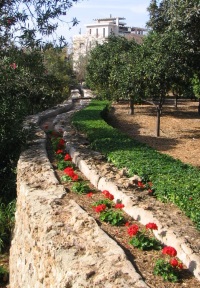Discourses of Society: Climate Change
September 27, 2014

Aqueduct-as-garden outside the Mansion of Mazra'eh in Israel. November 2010.
A small group gathered at the Bahá'í Center of Irving last night in our second meeting on the discourses of society, reflecting on climate change. The first meeting in the series was too much of a slide-based lecture, so for this second one we chose two videos and facilitated an open discussion. The conversation was robust, heartfelt, and meaningful – yet in reflection, it raises some key questions about how to have a productive, spiritually-oriented conversation.
After sharing a few prayers, we watched Bill Moyers's interview with the noted climate scientist and evangelical Christian, Dr. Katherine Hayhoe. This piece was chosen as a good way to bring up both the science and faith-based sides of climate change. And it certainly stirred up conversation. A few of the points I took note of:
- This interview focused heavily on religion and politics, but says nothing about the role of industry.
- Why do (many) people ignore recycling efforts?
- Is there anything the city could be doing to help us reduce waste?
- What incentives are used by governments to encourage proper sorting of garbage, recyclables, and even compost?
- The educational system must teach kids about environmental concerns. This led us into a struggle to precisely remember this quote:
"Regard man as a mine rich in gems of inestimable value. Education can, alone, cause it to reveal its treasures, and enable mankind to benefit therefrom."
- People are less likely to act when they think that an authority figure will "take care of things."
- For those not (yet) affected by natural disasters, changing our behaviors requires true compassion.
- We need to recognize and honor all the good that people are doing, not just dwell on that which is bad.
- For example, tell the city how much you appreciate that new naturalized landscape they've installed.
The item in bold was an important reminder that we cannot afford to wallow in hand-wringing and deprecation of society. In reflection: should the evening's moderator have done more to steer the conversation toward constructive, action-oriented analysis? Another point of reflection: while several points were raised that touch on Bahá'í beliefs, the meeting should have been framed with a brief introduction that included the passages from the Universal House of Justice, which were cited in that first presentation, as well as at least one passage from Bahá'u'lláh, such as
Be anxiously concerned with the needs of the age ye live in, and center your deliberations on its exigencies and requirements.
Before closing, we watched the remarkable video presentation of Kathy Jetnil-Kijiner's poem promising her baby that she and her fellow Marshall Islanders would not become climate refugees. It is perhaps the most evocative and stirring call to action that I have encountered. Following this, some of the last commentary of the evening dwelt on the need to expand our sense of self, beyond our own physical bodies. Through recognition of everyone as our sisters and brothers, even as our very selves, we see the harm of our actions and will begin to change our behavior. That sounds like a great topic for an entire evening's dialogue.
Questions for personal reflection, as moderator:
- For those who were not at the first meeting, what is the best approach to introducing the discussion series's purpose without boring those who were at the first? But maybe that is a false dichotomy.
- What is the right balance of "external resources" and Bahá'í writings in this context, and how do we encourage future speakers/moderators to seek that balance?
- How do we both acknowledge pain and uncertainty and yet instill a sense of hope and purpose?
- Does it make sense to actively steer the conversation? What is the balance between lecture and open-ended talk?
Personal notes from Dr. Hayhoe's interview:
- Paraphrase: When you don't trust the messenger, why would you listen? People of faith need to learn about climate change from other people of faith, not from those who have denigrated their faith in the past.
- Claim: Opposition to government, to the solutions, drives opposition to climate action more than denial of the science.
- Ask people: How does climate change affect your central concerns?
- Kids' health
- Job security
- Bills
- Faith
No TrackBacks
TrackBack URL: https://www.safnet.com/fcgi-bin/mt/mt-tb.cgi/133
Leave a comment